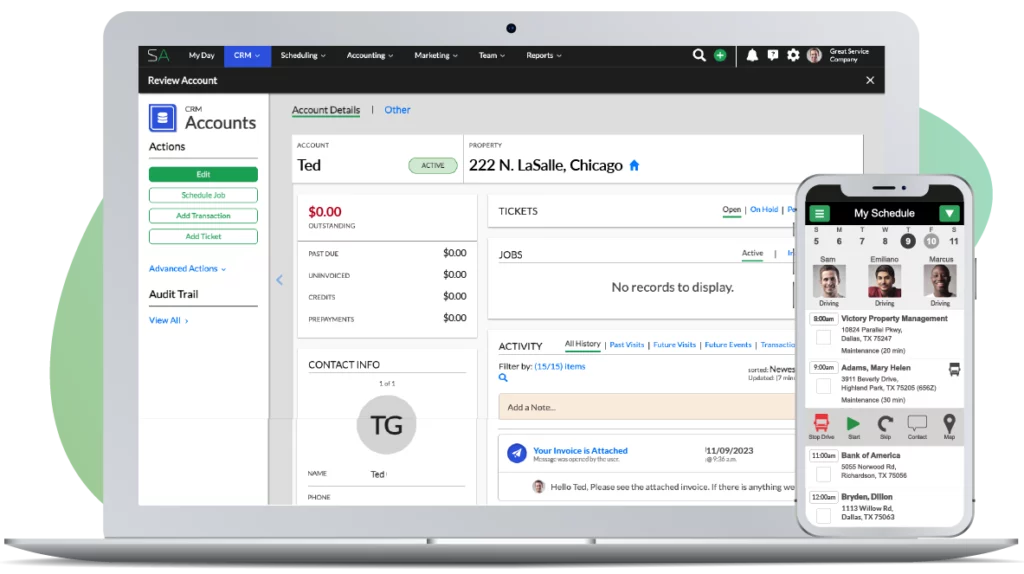Don’t be discouraged! You CAN start a landscape business with no money. Here is how…
This morning, I was driving into the office and, like I usually do, I was listening to a podcast. This particular podcast was an individual interviewing several guys that were worth hundreds of millions of dollars, that were doing really big and interesting things, and he was asking them about their businesses. I had the thought that these are guys that are extremely successful now, and they have been successful for quite some time, but the reality is if you go all the way back into their career to when they were in their early 20s, they had started another business and along the way they’ve had multiple businesses to finally arrive at the business that’s making them extremely wealthy.
The question that I get all the time is, “How do I raise money to start my business?” I feel like most people that ask that question, and this is a broad generalization, they sit on the sidelines waiting for the money to show up, when, in fact, they should just take some form of action. The reality about raising money to start a lawn care business or an irrigation business or a tree business is that it’s going to be really difficult to get that money. Unless you have equity in your home and you can refinance it or you have some other assets such as a paid-off car that you can finance and get cash or you have credit cards, you’re really left with asking a relative or a friend or a family member for money, or maybe there’s somebody you know that will invest in your business sort of as an angel. That would be a word that they’d use for it.
Outside of that, you’re generally not going to get a bank loan, and the reason for it is because these industries are higher-risk industries. They’re lower-barrier-of-entry businesses. That means a lot of people get into these businesses, they don’t make it, and they fail. There’s a lot of turnover with the smaller business. Now don’t let that scare you. Don’t think in any way that that means that that’s going to be the situation for you, because you’ll learn and you’ll do things other people aren’t going to do and, therefore, you’ll be successful.
The reality of it is it’s much like starting a restaurant. These businesses have high risk to the bank, so the banks don’t tend to like to loan money. You’re really going to have to get your money in one of the ways I described, friends, family, credit cards, taking out a mortgage on your home, things of that sort, or if you can find somebody that’s successful to loan you the money. They’re going to want a pretty big piece of your business for taking the risk along with you, because it’s a lot of risk. You’re giving away quite a bit of your business basically to just get a faster start.
The reason I told you about the podcast is I’d love to have you think about this a different way. Think about your business career as a journey. It’s so easy to read news articles and listen to podcasts and hear the story of the guy that’s in his 20s, and it’s generally a tech story these days. It’s a guy that’s in his 20s that just sold for $30 million or $40 million or $100 million or whatever that number is. The reality is there was a thousand other guys like him trying to do it that you never heard about. There’s a whole bunch of those guys that didn’t raise money to do it; they did it themselves. They cash floated themselves, they grew slower in the beginning, but later, things started to take off. My point here is that you only hear about the big stories, the very few. What it does to all of us is it makes all of us think that, “Man, I need to make it on my first thing. I need to have this first thing go big and go big fast, and I need to cash out and be done.”
The reality is, and the way I’d encourage you to think about this is, your business career is a journey. If you’re trying to find money for your first business now, this is your first business. If you learn the skills to build a company, you learn how to build a team and you learn how to market, you learn how to build a leadership team to help you run the company, you learn how to recruit, you learn how to sell, you learn how to cash float the company, you learn all the legal side of it, you learn all this stuff that, again, might intimidate you because it’s a lot of stuff to learn, but you don’t have to learn it all at once. It just slowly happens over time, and then one day you wake up and you’re like, “Man, I can’t believe I learned all that.”
If you go through that process, then you’ll know how to do your second business and your third business. There’s a next thing in life. We’re going to be around for a while. This is just your first thing. Who cares if it takes a couple extra years in the broad scheme of a 40-year career or maybe longer, because when you own the thing and other people run it for you, why would you retire? Back to my point, who cares if it takes you a couple years longer to build your very first thing, because along the way you learn a lot of lessons. If you could have 50 grand today to start it and you could shave 12 months of time off of growing the business by giving up some ownership and getting 50 grand or 100 grand versus not getting that money and taking a little bit longer to get there, does it really matter over the course of a 40-year period or a 30-year career, over the course of owning multiple companies? Maybe this is just your first thing.
I’m saying it’s going to be very difficult to go get a bank loan. You could find an investor. It’s going to be somewhat challenging, and if you’re going to get an investor, I wouldn’t just get one for money. I would get an investor that has the experience that can show you how to do it. Otherwise, you’re giving up a lot of equity and getting no advice. You’re just getting money. What happens when you raise money is you basically take money and you apply it to bad thinking, because in the beginning, you don’t know what to do, you don’t know the ideal business model, you don’t know who the ideal client is, you don’t know the marketing that works best.
You don’t know all these things, so what you do is you pour money into bad decisions, whereas if you have to first figure it out, you’re forced to be aggressive, you’re forced to scrap, you’re forced to work really hard. You’re forced to figure stuff out, find creative solutions because there isn’t any money, so you get to a place faster where you figured out what to do and what the right things to do are. My argument is that if you do raise money, it should probably be 4 or 5 years out when you’ve figured everything out, because now you can pour good money on top of good strategy instead of good money on top of bad thinking and bad strategy, and that’s what happens generally when you raise money early in the businesses.
Again, I say all that because I want to give you some encouragement that there’s an alternative way of thinking, that raising money probably isn’t even the best strategy anyway. If you can’t get it, don’t be completely beat down and say, “Well, I can’t do it. I’ll have to wait till some day I have money or some day I can raise money.” No, just go out and start doing this thing on the side now. Just get your first mower, get your first truck. Stock it with your initial irrigation parts. Get your first whatever, your pool equipment or whatever it is and just start doing some stuff on the side. Go make that first $1000. Then get that next $5000 in recurring business.
Yep, you didn’t have money, so it took a little longer to get there, but you got there. That’s the path to follow. Don’t be beat down if you can’t raise money, because it is very difficult to do in these types of businesses. Start doing something, and then think about what I was talking about. You’re playing the long game. This is not a figure-it-all-out, cash-out, 5-year kind of thing. This is build the experience so I can build the next thing that’s even bigger and then the next thing that’s even bigger. That’s how you create wealth and that’s how you create confidence, because you have the knowledge to go do whatever it is you want to do later in life and whatever business it is you want to build later in life. Don’t give up if you can’t raise the money. Just find an alternative way to get there.



